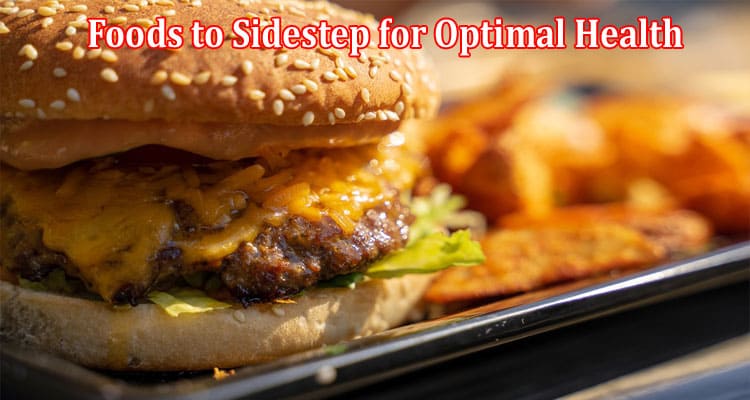Top 10 Culprits: Foods to Sidestep for Optimal Health
Author: Jemma Pringle
Amidst the abundance of choices available on this planet, some foods can sabotage our wellness and health goals. As you navigate the aisles of your local market and the menus of your favorite restaurant, awareness becomes your greatest ally. This comprehensive guide unveils the top ten culprits – foods to sidestep for a healthier journey. So, let’s delve into nutrition and unveil the dietary pitfalls that might hinder your path to wellness.
Sugary Beverages: A Sweet Trap
Sugary beverages lure us with their enticing flavors, but a myriad of health risks lie beneath the surface. Laden with excessive sugars they contribute to weight gain, spike blood sugar levels, and pose a threat to dental health. Research has linked regular consumption of sugary drinks to an increased risk of obesity, type 2 diabetes, and heart disease.
Instead of reaching for that soda, opt for healthier alternatives like water infused with fruits or herbal teas (you can do this at home). Alternatively, put together your own protein shake menu or update your current one. This way, you can make sure you’re swapping between recipes, giving yourself a variety of healthy flavours to look forward to. Not only will these alternative choices quench your thirst, but you’ll also support your overall health and well-being.
Processed Meats: Preserved Perils
Processed meats often find their way into our sandwiches and meals, but their convenience comes at a cost. Packed with preservatives, additives, and high levels of sodium, they raise the risk of heart disease, cancer, and other health issues.
Research indicates that regular consumption of processed meats is associated with an increased risk of colorectal cancer and cardiovascular disease. Rather, choose lean meats, poultry, fish, or plant-based alternatives to nourish your body without compromising your health.
Trans Fats: The Silent Saboteurs
Trans fats lurk in many processed foods, from fried items to packaged snacks, posing a significant threat to cardiovascular health. Consuming trans fats raises bad cholesterol levels while lowering good cholesterol, paving the way for heart disease and stroke.
Research suggests that eliminating trans fats from the food supply could prevent thousands of heart attacks and deaths each year. To safeguard your well-being, scrutinize food labels diligently and steer clear of products containing partially hydrogenated oils. By opting for foods free from trans fats, you’ll protect your heart and support your overall health for years.
Refined Carbohydrates: Empty Calories
Refined carbohydrates offer little nutritional value. They cause blood sugar levels to spike rapidly, leading to energy crashes and weight gain over time. Research has linked a high intake of refined carbohydrates to an increased risk of obesity, type 2 diabetes, and heart disease.
Opt for whole grain alternatives like brown rice, quinoa, or whole wheat bread to sustain energy levels and promote overall health. Incorporating whole grains into your diet will provide your body with essential nutrients and fiber while reducing your risk of chronic disease.
Artificial Sweeteners: Deceptive Delights
Artificial sweeteners promise the allure of sweetness without the calories, but their impact on health is far from benign. Research suggests they may disrupt metabolic processes, increase cravings for sugary foods, and even contribute to weight gain.
While artificial sweeteners are often marketed as a healthier alternative to sugar, studies have raised concerns about their potential negative effects on metabolism and gut health. Savor natural sweetness from fruits or use alternatives like stevia or monk fruit.
Fast Food: Convenience at a Cost
Fast food establishments beckon with their convenience and affordability, but their offerings often contain excessive calories, sodium, and unhealthy fats. Regular consumption of fast food is linked to obesity, heart disease, and other chronic conditions.
Research has shown that frequent consumption of fast food is associated with weight gain, insulin resistance, and an increased risk of type 2 diabetes. Prioritize home-cooked meals made from fresh, whole ingredients to nourish your body and safeguard your health.
By preparing meals at home, you’ll have greater control over the ingredients and cooking methods, allowing you to make healthier choices for yourself and your family.
Deep-Fried Foods: Culinary Pitfalls
Deep-fried foods, from french fries to chicken nuggets, may tantalize our taste buds but threaten our well-being. The process of deep-frying foods creates harmful compounds that contribute to inflammation, oxidative stress, and an increased risk of chronic diseases.
Research has linked the consumption of fried foods to an increased risk of obesity, heart disease, and stroke. Explore alternative cooking methods such as baking, grilling, or steaming to enjoy flavorful meals without compromising health. Reducing your intake of deep-fried foods will protect your health and support your overall well-being.
High-Sodium Foods: Salty Snags
Excessive sodium intake, often prevalent in processed foods, canned goods, and condiments, can wreak havoc on our health. High sodium levels contribute to hypertension, fluid retention, and an elevated risk of heart disease and stroke. Research has shown that reducing sodium intake can lower blood pressure and reduce the risk of heart disease and stroke.
Opt for fresh or minimally processed foods and flavor meals with herbs, spices, or citrus juices instead of relying on salt for seasoning. By reducing your intake of high-sodium foods, you’ll protect your heart and support your overall health for years to come.
Sugary Treats: Tempting Traps
Sugary treats like candies, cookies, and pastries offer a momentary indulgence but pose long-term consequences for our health. Excessive sugar consumption contributes to weight gain, tooth decay, insulin resistance, and an increased risk of chronic diseases.
Research has shown that a high intake of added sugars is linked to an increased risk of obesity, type 2 diabetes, and heart disease. Satisfy your sweet cravings with whole fruits, dark chocolate, or homemade treats sweetened with natural alternatives like honey or maple syrup.
High-Calorie Coffee Drinks: Stealthy Saboteurs
Coffee drinks laden with syrups, whipped cream, and sugary flavorings may seem harmless, but they pack a caloric punch that can derail your health goals. These beverages contribute to excess calorie intake, weight gain, and spikes in blood sugar levels.
Research has shown that frequent consumption of high-calorie coffee drinks is associated with weight gain. Opt for simpler coffee options like black coffee or espresso with minimal added ingredients to enjoy the benefits of caffeine without the added sugars and calories.
Conclusion
In the journey towards optimal health, mindful eating is paramount. By steering clear of these top ten culprits, you empower yourself to make informed dietary choices that support your well-being. Whether you’re perusing drip bar locations or pondering your ingredients for your next healthy shake, let this guide serve as a beacon, guiding you toward a healthier, happier you. Remember, small changes in your dietary habits can yield profound benefits!




